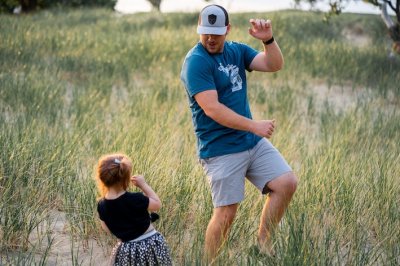Adult Playfulness – Can Lightening Up Change Your Life?

photo by Alex Green for Pexels
by Andrea M. Darcy
You tell your children to go out and play because it’s good for them. What about adult playfulness? Are you overlooking a powerful tool that could help transform your life?
What is adult playfulness?
We can say we are ‘being playful’ when we are flirting with or teasing someone.
But playfulness in adults is seen as something far more complex and important by psychologists.
In fact it has been the subject of quite a bit of research, and there are several models attempting to pin down an exact explanation of how it works.
The most recent definition making the rounds is by a team of European researchers led by German psychologist René T. Proyer. They suggest that,
“Those using playfulness ‘frame or reframe everyday situations in a way such that they experience them as entertaining, and/or intellectually stimulating, and/or personally interesting. Those on the high end of this dimension seek and establish situations in which they can interact playfully with others (e.g., playful teasing, shared play activities) and they are capable of using their playfulness even under difficult situations to resolve tension (e.g., in social interactions, or in work type settings).”
Proyer’s team even created a questionnaire to ‘test’ playfulness, the ‘OLIW’. This acronym stands for what is seen as the four main components of adult playfulness. These are:
- Other-directed (using playfulness to have fun interactions with others, to ease tension, to cheer people up)
- Lighthearted (see life as play, like to make things up as you go)
- Intellectual (creative thinking, word play, brainstorming)
- Whimsical (like the odd and unusual, choose to see things from a fun perspective).
Aren’t playful people childish and annoying?

photo by Liza Summer for Pexels
On the contrary. Proyer et. al point out that, “Playfulness is also associated with a preference for complexity rather than simplicity and a preference for—and liking of—unusual activities, objects and topics, or individuals.”
Also note that you don’t have to be extroverted or wild to be playful. As seen in the OLIW acronym above, playfulness can be in the way choose to think and see the world, not just in how we come across.
Why is playfulness important to wellbeing?
As children, and even in animals like primates, it’s clear the effect play has. It helps with learning, in building social structures and bonds, and also helps them physically, such as with balance and coordination. But what about in grownups?
Research shows a seriously impressive list of benefits for adult playfulness. These include:
- coping better with difficult experiences
- having a a wider perspective on things
- work performance
- creativity and staying motivated
- academic success
- feeling more confident and less of an impostor
- just generally feeling good.
And in one of their most recent studies Proyer’s team also looked at how playfulness affects our physical health. They found a connection between being playful and having good cardiorespiratory fitness and physical strength.
What playfulness can do for your relationships
Playfulness in relationships can be a very positive thing. It can:
- helps us bond with others
- reduce conflict and tension
- be a safer way to communicate and find shared meaning
- promote intimacy
- improve sexual satisfaction
- makes us visible and attractive to others
- helps us have positive emotions like joy and glee.
A 2021 Brazilian study took this research a bit further and looked at whether those with playfulness traits had more relationships than others. Men whose playfulness manifested more as ‘other directed’ were found to have more long and short-term relationships. For women, ‘whimsical playfulness’ led to more short-term relationships.
This supports an older study by American researchers that suggested playfulness is a desired characteristic in partners as it is seen as a sign of non-aggressiveness in men, and a sign of youth and fertility in women.
So how can I get more adult playfulness into my life?

photo by Josh Willink for Pexels
So what can you do if playfulness doesn’t seem a natural personality trait for you? How can you improve your playfulness game?
1. Make more time for kids and pets.
An easy entry into play is those who do it effortlessly, namely kids and pets. Take time to engage more with the kids and pets around you and let yourself enjoy the interactions fully, instead of your mind off being off thinking about other things.
2. Work with mindfulness.
Speaking of a wandering mind. Playful people are present-focused people, able to catch the small moments in front of them and notice the joy and humour around them. The more you can get your mind out of being so trapped by worry and regret, the more playful you can be. Mindfulness is the art of learning to be in the present, and it’s free and easy to learn (try our free guide to mindfulness as a starting point).
3. Make play a serious commitment.
We can tend to put off playfulness off as the last thing on the agenda. But looking at all of the above benefits, we are undoubtedly making a mistake if we do. So it can be about taking playfulness seriously enough we schedule it in our diaries as a non negotiable, over am ‘if I have time’. This can mean scheduling empty space in your diary to go and have impromptu fun and adventure, or to ‘hang out’ with your kids or friends.
4. Get out of your comfort zone.
Instantly say ‘no’ to everything? Sometimes we have trained ourselves to avoid anything that requires us to push ourselves a little. But play requires that slight effort. And we can often be surprised at how much fun something we just mindlessly said no to again and again can be, whether that is actually going to the salsa night your friend has mentioned a hundred times, or as simple as sitting up top and front of the bus like your kids keep begging to.
5. Work at caring less what others think.
Sometimes we say we are ‘just introverted’ but the truth is we are more just worried what others would think if we dared to not be perfect or seem serious.
But most people are so busy worrying about themselves and their own issues they don’t think about others. Or, if they do, it’s forgotten quickly. So next time your friend breaks into song in public and that old ‘oh my gosh I can’t dare join in as what are people thinking’ thought rises? Give it a go. By the time the others on the street get home you will be forgotten, but the joy you might find in that singing moment will stay.
Can therapy help me be more playful?
Yes. Therapy helps us to feel more confident and able to be ourselves, meaning we can be more open and playful in life and in our relationships.
Need help loosening up in life? We connect you to a team of top London-based psychotherapists in lovely central offices. Not in London? Use our therapy listings sites that offer UK-wide registered therapists ranked by other users.
 Andrea M. Darcy is a popular health writer and consultant helping people create their mental health journey. She is playful by nature! Find her @am_darcy.
Andrea M. Darcy is a popular health writer and consultant helping people create their mental health journey. She is playful by nature! Find her @am_darcy.




